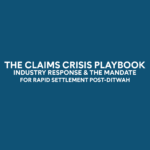As the year comes to a close, individuals and businesses in Sri Lanka should review their insurance policies. This crucial practice can help ensure coverage remains relevant, adequate, and aligned with current needs. Given changing circumstances, evolving risks, and shifts in the insurance landscape, a thorough review can help you make informed decisions about your coverage. This article outlines the key considerations and steps to conduct an effective end-of-year insurance policy review.
1. Assess Your Current Coverage
Start by gathering all your insurance documents, including health, life, property, vehicle, and business insurance policies. Review the coverage details, including the risks covered, policy limits, deductibles, and exclusions. Consider the following aspects:
- Adequacy of Coverage: Determine if your current coverage suits your needs. Have there been significant changes in your life, such as marriage, the birth of a child, or a new business venture? These changes may necessitate adjustments to your policy limits or types of coverage.
- Updated Asset Values: Evaluate the current value of your insured assets, such as your home, vehicle, or business equipment. Due to market conditions, property values may have appreciated, and ensuring that your coverage reflects these changes is essential.
2. Review Claims Experience
Consider any claims you may have made over the past year. Analyze the claims process and the outcomes to determine if your insurance provider met your expectations. Key questions to consider include:
- Was the claims process efficient? Reflect on how smoothly the claims were handled and whether the insurer provided adequate support.
- Were your claims settled fairly and promptly? Ensure the insurer honored the policy terms and compensated you fairly for covered losses.
If you faced challenges during the claims process, it might be an opportunity to reassess your choice of insurer.
3. Identify Changes in Risks
The risk landscape can change dramatically due to various factors, including economic conditions, natural disasters, or technological advancements. Consider how these changes may impact your insurance needs:
- Natural Disasters: Sri Lanka is prone to weather-related risks like floods, landslides, and cyclones. Assess whether your coverage adequately protects against these potential threats, especially if you live in high-risk areas.
- Health Risks: With the ongoing pandemic and changing health trends, consider whether your health insurance policy provides adequate coverage for your needs. Ensure that it includes essential services and treatments that may have emerged over the past year.
- Business Risks: If you run a business, evaluate any new risks that may have arisen, such as cybersecurity threats or changes in regulations. Ensure that your business insurance adequately covers these risks.
4. Evaluate Policy Terms and Conditions
Insurance policies often come with various terms, conditions, and exclusions that can impact your coverage. During your review, pay attention to the following:
- Policy Exclusions: Identify any exclusions in your policy that may leave you vulnerable to certain risks. Consider if additional coverage or riders may be necessary to bridge any gaps.
- Premium Adjustments: Review the premium amounts for each policy. If you notice significant increases, inquire about the reasons behind the changes and explore options for reducing costs, such as bundling policies or increasing deductibles.
- Renewal Terms: Understand the renewal terms for your policies and any changes that may occur upon renewal. Some insurers may adjust coverage limits or terms based on claims history or market conditions.
5. Seek Professional Guidance
Navigating the complexities of insurance can be challenging, especially if you have multiple policies. Consider consulting with an insurance broker or financial advisor who can provide insights and recommendations tailored to your situation. They can help you:
- Compare Policies: Analyze various insurance products available in the market to identify better options that may provide enhanced coverage at a competitive price.
- Understand Regulatory Changes: Stay informed about any changes in insurance regulations or industry practices that could impact your policies.
6. Plan for the Year Ahead
Once you have completed your review, take the opportunity to plan for the upcoming year. Consider the following steps:
- Adjust Coverage: Based on your assessment, make any necessary adjustments to your coverage. This could involve increasing policy limits, adding new types of coverage, or switching insurers for better terms.
- Document Changes: Record any changes to your insurance policies and ensure all parties involved have updated documentation.
- Set Reminders: Establish a schedule for regular annual insurance reviews to ensure your coverage remains aligned with your evolving needs.
Conclusion
Conducting an end-of-year insurance policy review is a proactive step toward ensuring that you and your assets are adequately protected. By assessing your current coverage, identifying changes in risks, and evaluating policy terms, you can make informed decisions that align with your evolving needs. In a rapidly changing world, staying vigilant about insurance coverage can provide peace of mind and financial security for the year ahead. Take the time to review your policies, seek professional guidance, and make any necessary adjustments to safeguard your future in Sri Lanka.











Leave A Reply